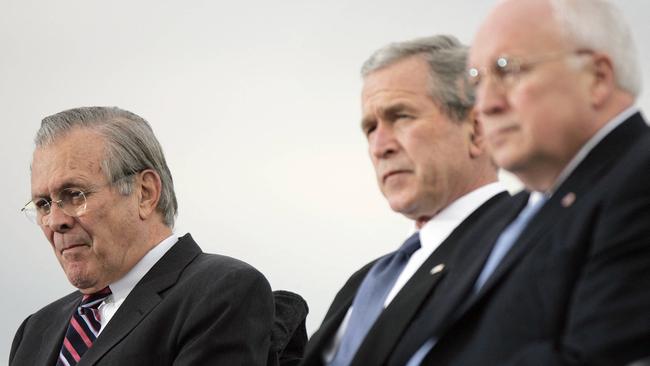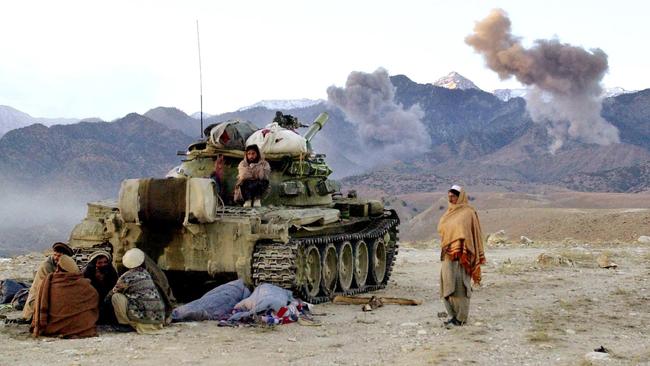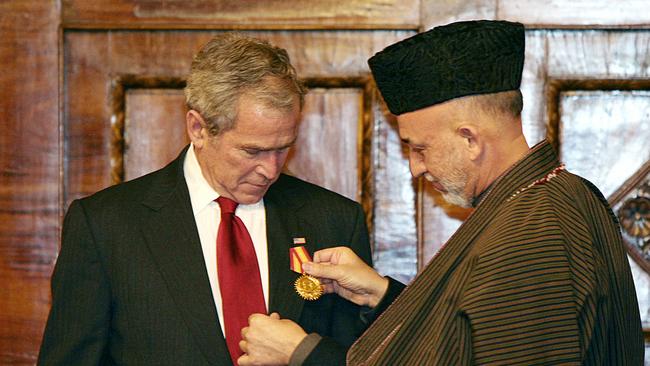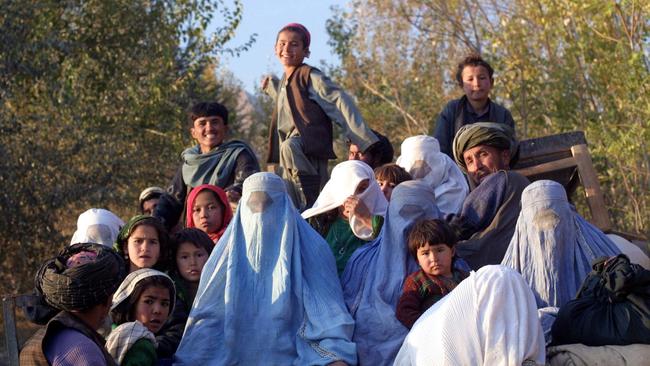Ultranationalists are to blame for Afghanistan, not Biden or Trump
The true miscreants are the supporters of the neo-con ideology who took over foreign policy under president George W. Bush.

In this spirit, it will now be said that President Joe Biden lost Afghanistan. It is easy to riposte that in every case the property wasn’t America’s to lose.
This week’s images of Taliban militia banishing the US will be imprinted on the world’s retina like those of the dramatic rooftop rescues from the US embassy in Saigon in 1975.
But Donald Trump and Biden don’t belong in the dock. The true miscreants are the supporters of the neo-con ideology who took over foreign policy under president George W. Bush with licence provided by 9/11.
It was their core belief that American power could remake the Middle East, that the US could triumphantly wage two simultaneous wars and seize a unipolar moment to entrench American global dominance.
Neo-conservatism was a cult and a heresy. This week’s mass surrenders confirm its failure.
Just as with Vietnam, America’s best and brightest underestimated insurgent enemies and were captured by fables – such as that the Iraqis and Afghans would welcome Western liberators, that a great power could remake the politics of small, weak states, and that military victory could be secured with a counterinsurgency manual.

As they put together their program in the early 1990s, the neo-cons scorned the relative caution of Bill Clinton and his advisers. One sneered they had “the stomach only to be halfway imperialists”. The thing was to go all the way and the word empire was not spurned, at least in private.
The arrogance of their ultranationalism would leave Trump’s “America First” in the shade.
Even without this ideological thrust, the collapse of the Soviet Union rendered these heady days.
In 1996 the US Joint Chiefs embraced “full spectrum dominance”, an ability to dominate any rival across a range of military operations, including war from space.
After Kabul, however, what does it mean to have Space Command with land, sea and air superiority if you get thrashed by villagers who don’t even know helicopter maintenance?
The Taliban pulverised America’s full spectrum dominance with small-infantry tactics, Toyotas and well-worn Kalashnikovs.
To win two simultaneous wars launched within 18 months of one another, the Pentagon settled on counterinsurgency (COIN), a doctrine crafted by scholar generals who had studied Vietnam. In Afghanistan, winning hearts and minds by building village wells failed to undercut a peasant mobilisation based on national pride and religious fervour. COIN also failed in Iraq. And in the Iraq-Syria theatre, it was the fighting prowess of the Kurds that crushed Islamic State, not the counterinsurgency field manual adopted in 2006.
Now counterinsurgency looks a distraction that once dominated West Point classrooms to no effect, broken and irrelevant.
As for the grand strategy of conducting open-ended wars to remake tribal societies, after this week it looks more preposterous than ever.
Not Trump nor Biden but Bush should be court-roomed. He gave the neo-cons his foreign policy and Dick Cheney, his vice-president, seized the chance. Cheney in 1992 had commissioned Paul Wolfowitz to draw up a new strategic doctrine. The Wolfowitz memorandum has legendary status, a blueprint for global hegemony that was to be threaded into something known as the Pentagon’s Defence Planning Guidance. It was part of a battle, in the last days of the first Bush administration, between adventurists Cheney and Wolfowitz, on the one hand, and Brent Scowcroft and George Shultz in the realist corner.

One commentator called the document an early version of Cheney’s “plan to rule the world”. Its ultranationalism became the benediction for the two big, hard wars. “We want more wars!” was to bray Norman Podhoretz, literary neo-con, to show the spirit of the war party, truculent in its armchairs.
The starting point in Wolfowitz’s vision, endorsed by Cheney and Bush, was that the US faced a world of enemies. Chaos loomed. But the US faced opportunity too – to use its military dominance to set up a new order of US and Israel-friendly regimes.
Supporting the embrace of global hegemony through military interventions, Charles Krauthammer, a leading neo-con propagandist, wrote one article under the heading “Universal Dominion”. The ambition cosmic, Vietnam forgotten, hubris unbared. That nothing could have been more inimical to Nixon-Kissinger realism, to the instincts of Ronald Reagan advised by Shultz, was not allowed to dilute the purity of the vision.
While Clinton had spoken of America as a good global citizen, Krauthammer countered that America is no mere international citizen. It is the dominant power in the world, more dominant than any since Rome.
“Accordingly,” argued Krauthammer, “America is in a position to reshape norms … and create new realities. How? By unapologetic and implacable demonstrations of will.”
Implacable demonstration of will was hardly on display in Biden’s speech about it being time for Americans to come home.

Neo-cons brought to the Bush administration another Wolfowitz-Cheney notion: the idea of pre-emptive war – something a wiser Republican president, Dwight D. Eisenhower, had dismissed as unthinkable.
No club lounge warrior, Eisenhower, of course, had directed real battlefields.
America, Bush announced in 2002, would “go on the offence and stay on the offence”. In those words – “stay on the offence” – you have the basis for a long war in the Afghan hills, a self-deluding enterprise lost this week.
Where are they today, the ideologues and faddists? Some like Donald Rumsfeld, Irving Kristol and Krauthammer have passed on. But Cheney, Wolfowitz, John Bolton, Eliot Cohen, Elliott Abrams and Richard Perle are still around.
None, however, is putting up a hand to take responsibility for the folly of crafting imperial designs that, astonishingly, have just been banished by ragged insurgents who had waited in the hills for the signal to move. You might say, for their own unipolar moment.
Bob Carr is the longest-serving premier of NSW and a former Australian foreign minister.



So early in his administration too, and so unfair. But it’s in keeping with a tradition that says Harry Truman lost China, John Kennedy lost Cuba and Lyndon Johnson lost Vietnam.